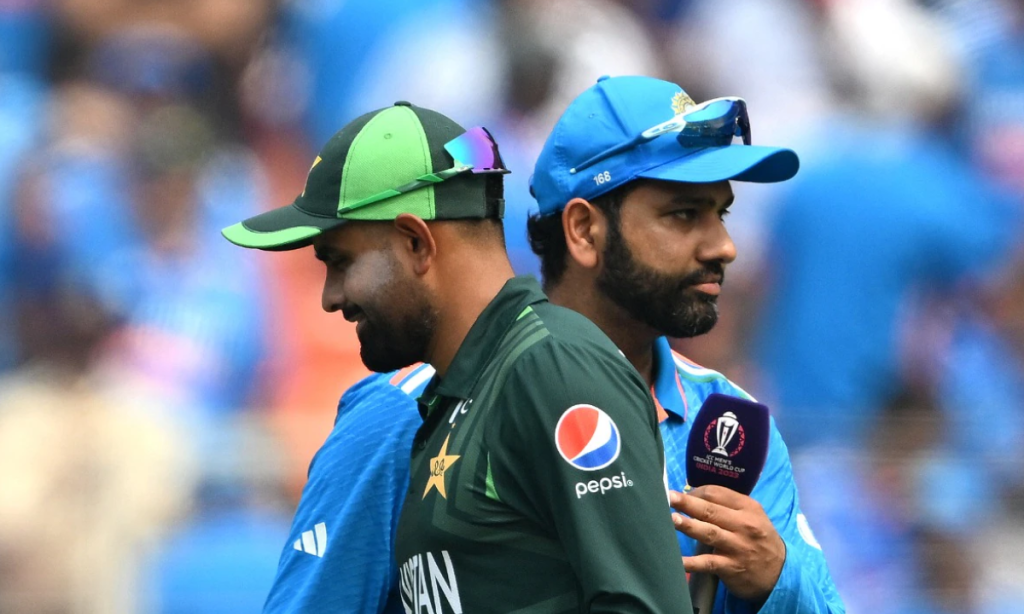The cricketing rivalry between India and Pakistan has always been more than just a game; it is a reflection of the complex geopolitical tensions that exist between the two nations.
As the cricketing world looks ahead to the 2026 T20 World Cup, former Pakistani cricketer Basit Ali has made headlines by urging the Pakistan Cricket Board (PCB) to adopt a retaliatory stance against India.
This call comes in response to the Board of Control for Cricket in India (BCCI) announcing that the Indian cricket team jersey will not feature the name “Pakistan” for the upcoming ICC Champions Trophy.
Furthermore, Indian captain Rohit Sharma’s decision not to attend the opening ceremony in Pakistan has added fuel to the fire of this ongoing rivalry.
The Context of the Rivalry
The cricketing relationship between India and Pakistan has been fraught with tension, largely influenced by the political climate between the two countries.
The last bilateral series took place during the 2012-13 season in India, and since then, both teams have only met in ICC tournaments.
The geopolitical landscape has made it increasingly difficult for the two nations to engage in regular cricketing fixtures, with the last tour by India to Pakistan occurring in 2008.
The recent announcement by the BCCI regarding the jersey branding has reignited discussions about the significance of these decisions.
Basit Ali’s comments reflect a sentiment among some Pakistani cricket fans and former players who feel that India’s decisions are not just a matter of sportsmanship but are deeply intertwined with national pride and identity.
Basit Ali’s Call for Retaliation
In a recent YouTube video, Basit Ali expressed his views on the situation, stating that Pakistan should not be disheartened by India’s decisions.
He emphasized that silence could be the most powerful response. “India has refused to print Pakistan’s name on their jersey, and Rohit Sharma won’t travel to Pakistan. But why do you get upset? Silence is the best answer,” Ali stated.
His perspective suggests that Pakistan should not react impulsively but rather take a measured approach to protest against what they perceive as disrespect.
Ali further advised the PCB to formally register their protest by sending an email to the BCCI, documenting their grievances without escalating the situation.
This approach, he argues, would be a dignified way to respond to India’s actions without compromising the integrity of the game or the spirit of sportsmanship.
A Mirror Response for the 2026 T20 World Cup
Ali’s most provocative suggestion was that Pakistan should adopt a similar policy for the upcoming 2026 T20 World Cup, which is set to be hosted in India.
He proposed that Pakistan could refuse to print India’s name on their jerseys and that their captain should also refrain from attending any ceremonies.
“It won’t cause a problem for Pakistan; it will harm world cricket and Jay Shah,” he remarked, highlighting the potential repercussions of such a stance on the broader cricketing community.
This call for a reciprocal response raises important questions about the role of sports in international relations.
Should cricket be used as a platform for political statements, or should it remain a space for camaraderie and competition?
The implications of such actions could extend beyond the cricket field, affecting diplomatic relations and the future of cricketing ties between the two nations.
The Impact of Geopolitical Tensions on Cricket
The ongoing geopolitical tensions between India and Pakistan have had a significant impact on cricketing relations.
The inability to conduct bilateral series has deprived fans of one of the most anticipated rivalries in sports.
Matches between the two teams are often charged with emotion, and the atmosphere is electric, drawing in millions of viewers worldwide.
However, the political climate has forced both nations to navigate a complex landscape where cricket becomes a reflection of broader issues.
The last time Pakistan toured India was for the 2012-13 series, and since then, the two teams have only met in ICC tournaments.
The lack of regular encounters has diminished the intensity of the rivalry, and fans are left yearning for more.
The 2023 ODI World Cup saw Pakistan visiting India, but the absence of bilateral series has created a void that is difficult to fill.
The Future of India-Pakistan Cricket
As the cricketing world looks forward to the 2026 T20 World Cup, the future of India-Pakistan cricket remains uncertain.
The decisions made by both boards will play a crucial role in shaping the dynamics of their relationship.
If Pakistan chooses to adopt a retaliatory stance, it could set a precedent for how both nations engage with each other in the future.
The cricketing community is divided on the issue.
Some believe that sports should transcend politics and that players should focus on the game rather than the geopolitical landscape.
Others argue that the actions of the boards reflect the sentiments of their respective nations, and therefore, they must respond accordingly.
In Summary
Basit Ali’s call for Pakistan to retaliate against India’s decisions regarding jersey branding and participation in the 2026 T20 World Cup highlights the intricate relationship between cricket and politics.
As both nations navigate this complex landscape, the future of their cricketing rivalry hangs in the balance.
The decisions made by the PCB and BCCI will not only impact the players and fans but could also have far-reaching implications for the diplomatic relations between India and Pakistan.
The hope remains that cricket can serve as a bridge between the two nations, fostering goodwill and camaraderie rather than division.
The upcoming T20 World Cup presents an opportunity for both teams to showcase their talent and passion for the game, irrespective of the political climate.
As fans eagerly await the matches, the hope is that the spirit of cricket prevails, allowing for a celebration of the sport that unites millions across borders.

